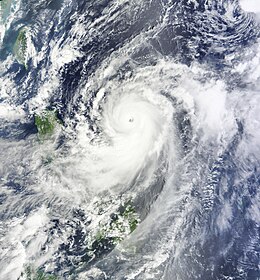Typhoon Jelawat (2012)
| Typhoon (JMA scale) | |
|---|---|
| Category 5 (Saffir–Simpson scale) | |

Typhoon Jelawat at peak intensity on September 25
|
|
| Formed | September 20, 2012 |
| Dissipated | October 3, 2012 |
| (Extratropical after October 1, 2012) | |
| Highest winds |
10-minute sustained: 205 km/h (125 mph) 1-minute sustained: 260 km/h (160 mph) |
| Lowest pressure | 905 hPa (mbar); 26.72 inHg |
| Fatalities | 2 total |
| Damage | $27.4 million (2012 USD) |
| Areas affected | Japan, Philippines, Taiwan |
| Part of the 2012 Pacific typhoon season | |
Typhoon Jelawat, known in the Philippines as Typhoon Lawin, was the most intense tropical cyclone of the 2012 Pacific typhoon season in terms of ten-minute maximum sustained winds, tied with Typhoon Sanba. Following Bolaven and Sanba, Jelawat was the third typhoon directly hitting Okinawa Island in 2012. Jelawat, which means carp in Malaysian, is a type of freshwater fish.
Jelawat reached peak intensity late on September 24 and maintained it for nearly two days. The typhoon passed through Okinawa Prefecture on September 29 and finally made landfall over Aichi Prefecture in Japan on September 30. Jelawat was the strongest typhoon for Okinawa Island in 2012 by observed winds, as it also killed 2 people in Japan.
Late on September 17, a tropical disturbance formed east of Guam, and the Joint Typhoon Warning Center (JTWC) issued a Tropical Cyclone Formation Alert on the system in the next two days, shortly before the Japan Meteorological Agency (JMA) upgraded the low-pressure area to a tropical depression early on September 20. Several hours later on September 20, the Philippine Atmospheric, Geophysical and Astronomical Services Administration (PAGASA) upgraded the system to a tropical depression named Lawin, before JTWC also upgraded it to a tropical depression due to low vertical wind shear and improved equatorward outflow. Soon, JMA upgraded the system to a tropical storm and named it Jelawat, so did JTWC.
...
Wikipedia
